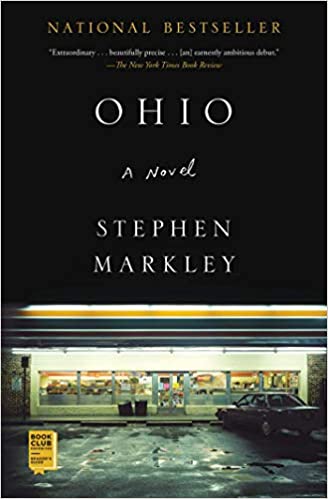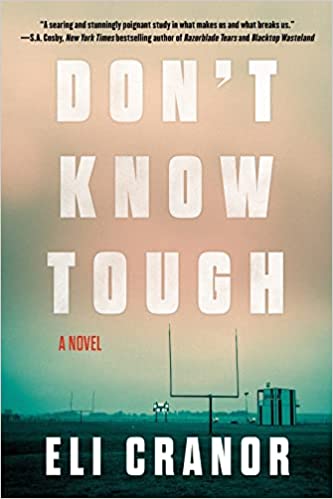There are a lot of complaints about Hollywood. Too political. Not political enough. The most egregious (and really, the most obvious) one is originality. Everything’s a reboot or a remake or a big-budget franchise. Really, how many Fast & Furious movies do we really need?
And it’s all so homogenized. Everything looks like it came out of the same three Hollywood boardrooms. Excuse me. I’ll be over in the corner yawning.

To me, books are the only place left where we get snapshots of different parts of the country, and from different points of view. I first started noticing it when I read two of SA Cosby’s novels, Blacktop Wasteland and Razorblade Tears, the latter one of my favorite reads for 2022.
What drove it home, though, was Stephen Markley’s Ohio: A Novel. Markley writes about early millennials reaching the end of their limited time of immortality (Yes, that’s more a Gen X reference, but Rush is eternal.) Still, Markley’s fictional Ohio town is one I’ve been to many times in many different parts of my home state. My mind’s eye inserted a sleepy former railroad town of Lucas, off I-71 and a gateway to Amish country. But the dynamics of the drifting circle of high school friends around a suicide and a missing girl – one who is either dead or wandering around Southeast Asia – are familiar. My circle of high school friends could probably make it a book club read.
If we did book clubs. And half of us weren’t siloed into spec fic, political screeds, or romance.

Contrast the two: Razorblade and Ohio. Cosby and Markley spare the reader nothing. All the prejudices and shortcomings of the characters are on full display. Once, in an interview, Cosby even said you can’t write about the south without addressing racism or religion. The two are intertwined with life there and nowhere near as simplistic as your average Facebook meme would have you believe. And yet, Cosby is a proud southerner. Markley’s info doesn’t say where he’s from, but he lives in LA. Still, he nails the Rust Belt vibe, where people here are still mourning the death of the Midwest’s industrial heyday as nothing has replaced it.
I have to give bonus points to Cosby, though. Markley fails to capture the Midwestern obsession with music. It might be that our love of rock and roll you never heard of faded as Gen X started staring 40 in the face, but in my younger days, I had an acquaintance who once lived in New York get very angry that I know about REM and Nine Inch Nails before she did. “There is no Cleveland music scene!” (Sweetie, Trent Reznor is from Cleveland, and we listened to prog long before Canada picked up on it. And Canada was prog’s early adopters.) Cosby slips the music in there. He’s not as nerdy or obscure about it as, say, George Pelecanos, who knows what brand of chewing gum Aretha Franklin chewed before which track was recorded. (I have a simliar neurosis around the Stones and what Keith had for breakfast this morning: Sourdough toast and a cup of coffee. Thanks for asking.)

But what really drove this home came from another novel by Eli Cranor, Don’t Know Tough. Like Cosby, Cranor is a Southerner, from Arkansas, actually. Don’t Know Tough revolves around that most Southern of institutions, high school football. (Friday Night Lights fans, rejoice.) But his novel is set in the foothills of the Ozarks, not in Bentonville or Little Rock, where political or corporate shenanigans would be more appropriate. Nope. In 2022 rural Arkansas, Cranor, who played and coached football there, puts all the prejudices and machinations of a small town on display.
That’s not to say a more urban story couldn’t get us into a corner of America we don’t normally see. Michael Connelly’s LA, which bears little resemblance to [insert TV show set in Los Angeles here], is a character unto itself. Stephen King’s Maine may be fictional, but drive from Burlington, Vermont through New Hampshire, and into anywhere in Maine, and it’s instantly familiar, especially if you drive down that stretch of secondary highway that inspired the events of Pet Sematary. (Spoiler alert: Nothing supernatural happened on the family trip to Maine last year. Though I did by a copy of Mr. Mercedes in Bar Harbor. I was in Maine. How can I not buy a Stephen King novel?)
Regionalism has become one of the great social plagues of the twenty-first century at a time when it has no place in America. Novels are rapidly becoming the last bulwark against that.
Bought a Tony Hillerman paperback displayed on a rug well out of my price range while visiting the Navajo Nation. I think some novels (to varying degrees) capture a local vibe/essence but most that cross the golden bridge to movie or TV land have the “butts in seats” equation injected. Insight gives way to revenue. Thanx for the book suggestions.